|
|
|
Sort Order |
|
|
|
Items / Page
|
|
|
|
|
|
|
| Srl | Item |
| 1 |
ID:
128862
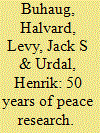

|
|
|
|
|
| Publication |
2014.
|
| Summary/Abstract |
Established in 1964, the Journal of Peace Research (JPR) celebrates 50 years. This anniversary special issue of the journal offers broad reviews of research areas that have been central both to the journal and to the field of peace and conflict research generally. An opening article co-authored by long-time editor Nils Petter Gleditsch offers a historical view on peace research and tracks trends in the use of 'peace' and 'violence' in titles of JPR across the first 49 volumes of the journal. Opening the review article section, two contributions address key thematic areas for the journal. Few if any subjects have attracted more attention in the study of international relations during the second half of JPR's first 50 years than the democratic peace, and in the extension of this subject, the broader debate about the liberal peace. Additional articles review the status and propose future developments in the study of war and its relationship with territory, ethnicity, ideology and natural resources. Another key historical topic associated with the journal concerns the economic cost of military conflict, while more recent research fields covered include terrorism and human rights, topics that have grown to become major JPR niches. Reflecting the methodological contributions by JPR, two articles focus on challenges of contemporary quantitative political analysis and progress in peace and conflict data collection. Finally, this special issue includes a review of research on international mediation in armed conflicts.
|
|
|
|
|
|
|
|
|
|
|
|
|
|
|
|
| 2 |
ID:
172844
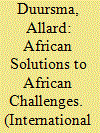

|
|
|
|
|
| Summary/Abstract |
The current scholarly literature on the international mediation of civil wars draws predominantly on a rationalist-materialist perspective. This perspective suggests that the ticket to mediation success is the material manipulation of the bargaining environment by third parties with a high degree of economic and military resources. I argue that legitimacy also determines outcomes of mediation because if a mediator has legitimacy, it can continue to look for a mutually satisfactory outcome and try to pull the conflict parties toward compliance. I show that legitimacy matters by systematically comparing the effectiveness of African and non-African third parties. African third parties are typically considered ineffective because of a low degree of economic and military capacity. However, they effectively mediate civil wars in Africa because of a high degree of legitimacy, which is a result of a strong conviction within the African society of states that African mediation is the most desirable type in conflicts there. Drawing on data from the Uppsala Conflict Data Program supplemented with unique data, which together cover all mediation efforts in Africa between 1960 and 2017, I find quantitative evidence supporting the effectiveness of African third parties. Compared to non-African ones, African third parties are far more likely to conclude negotiated settlements that are more likely to be durable. African third parties are especially effective if the conflict parties are highly committed to the African solutions norm. Theoretically, this study deviates from much of the literature that puts forward solely rationalist-materialist explanations of mediation success. By bringing legitimacy to the forefront, this article supplements the current mediation literature that emphasizes material sources of power and ignores social structures.
|
|
|
|
|
|
|
|
|
|
|
|
|
|
|
|
| 3 |
ID:
143215
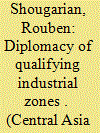

|
|
|
|
|
| Summary/Abstract |
The author investigates an alternative, indirect settlement between Armenia and Turkey expected to lead the negotiations out of the dead end into which they were pushed by the refusal of Ankara and Yerevan to ratify the Zürich Protocols. On the one hand, American-Swiss mediation and the shuttle diplomacy of 2008-2009, crowned by the sensational signing of the Turkish-Armenian protocols, inflated international expectations. On the other, the euphoria created by what looked like a fundamental solution to one of the most complicated conflicts of the twentieth century proved to be short-lived.
|
|
|
|
|
|
|
|
|
|
|
|
|
|
|
|
| 4 |
ID:
060617
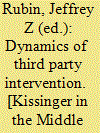

|
|
|
|
|
| Publication |
New York, Praeger, 1981.
|
| Description |
xi, 301p.
|
| Standard Number |
0030510619
|
|
|
|
|
|
|
|
|
|
|
|
Copies: C:1/I:0,R:0,Q:0
Circulation
| Accession# | Call# | Current Location | Status | Policy | Location |
| 019870 | 327.73056/RUB 019870 | Main | On Shelf | General | |
|
|
|
|
| 5 |
ID:
160807
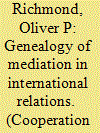

|
|
|
|
|
| Summary/Abstract |
What does it mean to mediate in the contemporary world? During the Cold War, and since, various forms of international intervention have maintained a fragile strategic and territorially sovereign balance between states and their elite leaders, as in Cyprus or the Middle East, or built new states and inculcated new norms. In the post-Cold War era intervention and mediation shifted beyond the balance of power and towards the liberal peace, as in Bosnia-Herzegovina, Kosovo, and Timor Leste. In the case of Northern Ireland, identity, territorial sovereignty, and the nature of governance also began to be mediated, leading to hints of complex, post-liberal formulations. This article offers and evaluates a genealogy of the evolution of international mediation.
|
|
|
|
|
|
|
|
|
|
|
|
|
|
|
|
| 6 |
ID:
165663
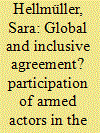

|
|
|
|
|
| Summary/Abstract |
This article provides an analytical framework to understand how participation of armed actors in peace negotiations influences local violence. It argues that the link between violence and exclusion or inclusion of armed actors is often indirect and depends on armed actors’ underlying motivations to be included and their corresponding strategies. Based on an analysis of the Congolese peace process from 1999 to 2003, the article assesses how the mandate of the peace process influenced armed groups’ motivations to be included. It then analyzes the strategies that armed actors used to be included and examines their impact on local violence. Thereby, it allows for a more nuanced understanding of how participation of armed actors in a mediation process influences prospects for peace.
|
|
|
|
|
|
|
|
|
|
|
|
|
|
|
|
| 7 |
ID:
123350
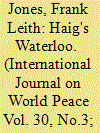

|
|
|
| 8 |
ID:
145696
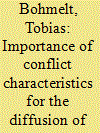

|
|
|
|
|
| Summary/Abstract |
This article argues that similar conflict characteristics form links between crises, which signal the relevant actors – that is, the belligerents and the potential mediator(s) – that a comparable approach in terms of third-party mediation could be suitable across these disputes – even if the relevant parties are not the same. Specifically, demand (antagonists) and supply-side actors (mediators) are likely to employ the heuristic of learning from and emulating the mediation behavior in similar crises. The empirical analysis, using data from the International Crisis Behavior project, shows that comparable patterns in violence, arguably the most visible and salient conflict characteristic, are associated with mediation traveling across crises; other dispute characteristics incorporated into spatial lags are not, however. Hence, particularly as domestic/unit-level (monadic) influences are controlled for, the effect of common exposure is taken into account, and different estimation strategies are used, the results emphasize that there is a genuine diffusion process via common levels of violence in the context of international mediation.
|
|
|
|
|
|
|
|
|
|
|
|
|
|
|
|
| 9 |
ID:
131108
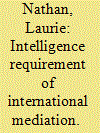

|
|
|
|
|
| Publication |
2014.
|
| Summary/Abstract |
This article explores the intelligence requirement of international mediation, a topic that is ignored in both the literature on conflict resolution and the literature on intelligence. A mediator's strategies and tactics ought to be informed by a deep understanding of the parties' internal calculations about the conflict and its resolution. Intelligence is needed to gain this understanding because the parties typically do not reveal their sensitive deliberations to outsiders. United Nations mediation teams should have a monitoring and analysis unit that endeavours to meet this need and reduce the ignorance that commonly afflicts international mediation.
|
|
|
|
|
|
|
|
|
|
|
|
|
|
|
|
| 10 |
ID:
133153
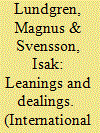

|
|
|
|
|
| Publication |
2014.
|
| Summary/Abstract |
Two characteristics of mediators - bias and leverage - are discussed intensively in the research on international mediation. However, whereas bias and leverage have been examined in mediation by states, relatively little is known about their role in mediation by international organizations (ios). This study provides new ways of conceptualizing io bias and leverage and utilizes unique data to measure the impact of io bias and leverage on mediation outcomes. Exploring all cases of civil war mediation by ios in the period 1975-2004, we find that ios where member states provide support to both sides in a conflict outperform ios whose member states remain disinterested. ios with significant trade leverage also increase the likelihood of mediation success. The study demonstrates that ios rarely have a neutral relationship to civil war combatants, that mediation by ios is laden with member state interests, and that such interests shape outcomes.
|
|
|
|
|
|
|
|
|
|
|
|
|
|
|
|
| 11 |
ID:
020793
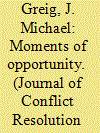

|
|
|
|
|
| Publication |
Dec 2001.
|
| Description |
691-618
|
|
|
|
|
|
|
|
|
|
|
|
|
|
|
|
| 12 |
ID:
165666
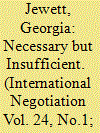

|
|
|
|
|
| Summary/Abstract |
Civil conflicts are more intractable and complex than ever before. In these conflicts, civilians are increasingly targeted and weaponized. Yet, because civilians are disproportionately affected by the ensuing violence and instability, they also have a larger role to play in the peacemaking process. This stems from the fact that local civil society organizations (CSO) assume new responsibilities vis-a-vis their communities as the state disintegrates. They often became the coordinators and providers of basic security and services. Unsurprisingly, CSO leaders often emerge as the only credible and authoritative actors in this complex environment, trusted by both the disputing parties and the affected communities. This article argues that CSOs are necessary to any international mediation process; however, they must be leveraged in conjunction with conventional third party mediator resources (that is, financial, technical and military assistance) to maximize the potential of an enduring peace deal.
|
|
|
|
|
|
|
|
|
|
|
|
|
|
|
|
| 13 |
ID:
133155
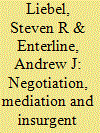

|
|
|
|
|
| Publication |
2014.
|
| Summary/Abstract |
How do negotiation and mediation affect the likelihood of insurgent victory in counterinsurgency (coin) wars? We develop expectations regarding the incentives of the combatants to negotiate and accept mediation while a coin war is under way, and the evolution of these incentives as a war progresses. Thirty nine civil wars are examined in which a foreign power intervenes to defend a central government against an insurgency during the period 1945-2009. We identify the subset of coin wars in which negotiations and mediation were attempted or took place, as well as their timing. The study examines whether the resort to these two instruments affects the subsequent duration and outcome of coin wars. We find that the resort to negotiations and mediation accelerates the time to insurgent victory, and explore reasons why political leaders in foreign powers would pursue such a path given the consequences of such action.
|
|
|
|
|
|
|
|
|
|
|
|
|
|
|
|
| 14 |
ID:
105644


|
|
|
|
|
| Publication |
2011.
|
| Summary/Abstract |
This article is concerned with a particular debate in mediation literature, revolving around the merit and necessity of power as a strategy employed by third parties in their efforts to negotiate a successful resolution to conflict. We argue that by subscribing to a one-dimensional spectrum of pure-to-power mediation, students of mediation have neglected the development of how power is conceptualised and operates within the changing dynamics of conflict and its mediation.
We therefore seek to redefine the concept of power mediation to project a closer fit between conflicting parties' understanding of their situation and the methods, aims and motivations of their mediators. Breaking away from the existing pure-power spectrum, we propose a heuristic framework that includes four distinct types of power mediation, defined here as real, made, critical and structural power. The contribution of our heuristic model is threefold. First, it assists us in asking the most basic question of social science research, 'of what is this a case', which in turn ought to lead to a more sophisticated observation of mediation instances. Concurrently, through the frame of 'power', it establishes common understanding of observable phenomena that makes the study of mediation more accessible to the wider audience beyond students of our modest literature. Finally, the synthesis of epistemological and ontological inquiry of conflict and power with the established International Relations (IR) approaches of realism(s), constructivism, critical discourse and structuralism, allows respective real, made, critical and structural types of mediation power to be tested.
|
|
|
|
|
|
|
|
|
|
|
|
|
|
|
|
| 15 |
ID:
117454
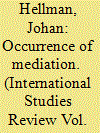

|
|
|
|
|
| Publication |
2012.
|
| Summary/Abstract |
Scholars of international mediation have paid insufficient attention to the determinants of mediation incidence. This is unfortunate, since a better understanding about what circumstances promote mediation occurrence would be of great benefit to other branches of the field, as, for example, mediation efficiency evaluation. This literature review addresses this topic, reviews the current literature, evaluates and problematizes some core concepts and assumptions, and suggests ways forward. It especially emphasizes the critical need of approaching the theoretical debates of international relations to provide a more solid base for mediation studies, and to enrich the field with studies that explore the potentials of a plurality of theoretical perspectives.
|
|
|
|
|
|
|
|
|
|
|
|
|
|
|
|
| 16 |
ID:
052958
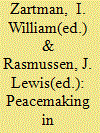

|
|
|
|
|
| Publication |
Washington, D C, United States Institute of Peace Press, 1997.
|
| Description |
ix, 412p.
|
| Standard Number |
1878379607
|
|
|
|
|
|
|
|
|
|
|
|
Copies: C:1/I:0,R:0,Q:0
Circulation
| Accession# | Call# | Current Location | Status | Policy | Location |
| 046713 | 327.172/ZAR 046713 | Main | On Shelf | General | |
|
|
|
|
| 17 |
ID:
025913
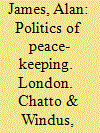

|
|
|
|
|
| Publication |
London, Chatto & Windus, 1969.
|
| Description |
452p
|
| Series |
Studies in international security
|
|
|
|
|
|
|
|
|
|
|
|
Copies: C:1/I:0,R:0,Q:0
Circulation
| Accession# | Call# | Current Location | Status | Policy | Location |
| 004254 | 327.172/JAM 004254 | Main | On Shelf | General | |
|
|
|
|
| 18 |
ID:
184659


|
|
|
|
|
| Summary/Abstract |
This article discusses how the institutionalization of international mediation practices and its growing relevance since the end of the Cold War coincided with the formation of an epistemic community that shares common practices for a third party. This community focuses on core concepts that structure mediation practices such as efficiency, rationality, and the management of time and information. The article analyzes the consolidation of this community through the circulation of knowledge among scholars and practitioners. In particular, it highlights the place of the concept of ripeness, developed by Ira William Zartman, in stabilizing a division between a moment of conflict and a moment of nonconflict; and it discusses the place of the UN system in its dissemination among mediation practitioners. The article argues that the project-oriented understanding of mediation practices that arises from these shared conceptions contributes to an insulation of these practices from broader views of conflict within international politics.
|
|
|
|
|
|
|
|
|
|
|
|
|
|
|
|
| 19 |
ID:
062218
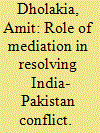

|
|
|
|
|
| Publication |
New Delhi, Manohar, 2005.
|
| Description |
131p.
|
| Series |
RCSS policy studies; 29
|
| Standard Number |
8173046298
|
|
|
|
|
|
|
|
|
|
|
|
Copies: C:1/I:0,R:0,Q:0
Circulation
| Accession# | Call# | Current Location | Status | Policy | Location |
| 049679 | 327.5405491/DHO 049679 | Main | On Shelf | General | |
|
|
|
|
| 20 |
ID:
128875
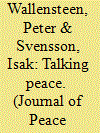

|
|
|
|
|
| Publication |
2014.
|
| Summary/Abstract |
Mediation, as a means to end armed conflicts, has gained prominence particularly in the past 25 years. This article reviews peace mediation research to date, with a particular focus on quantitative studies as well as on significant theoretical and conceptual works. The growing literature on international mediation has made considerable progress towards understanding the conditions under which mediation processes help bring armed conflicts to peaceful ends. Still, the field of international mediation faces a number of problems. In this article, we aim to identify findings on mediation frequency, strategies, bias, and coordination as well as on trends in defining success. Although previous research has generated important insights, there are still unresolved issues and discrepancies which future mediation research needs to explore. Many of the challenges that the field faces could be managed by giving greater attention to accumulative knowledge production, more disaggregated analysis, and a closer dialogue between policy and research.
|
|
|
|
|
|
|
|
|
|
|
|
|
|
|
|
|
|
|
|
|